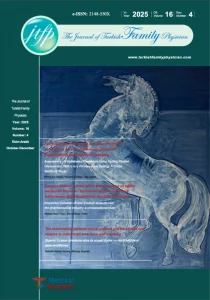A qualitative study to evaluate common problems of primary health care physicians about patients
Backround and Aim: This qualitative study was carried out on a group of physicians who are working in the primary health care services, to investigate the problems between physicians and patients, the causes of these problems and suggestions for solution.
Methods: Our qualitative study was conducted with the participation of 18 physicians, 14 of them were working in family health centers and 4 of them working in community health centers in a district of Istanbul’s Anatolian side. The data were collected by three semi-structured focus group interviews and seven in-depth interviews.
Results: The most frequently encountered problems of the physicians in our research were the requests of unnecessary prescription, violence against physicians, examination rank related problems, visit requests during overtime work hours, unnecessary complaints by the patients to the authorities and communication problems. The main reasons for these problems were misrepresentation of primary health care services, some administrative reasons, and lack of communication skills of physicians and patients. Solution proposals offered were; establishing new institutions to provide counseling to physicians for legal issues, improving communication skills, applying sanctions to prevent unnecessary complaints, and some recommendations for administrative reasons.
Conclusion: According to our findings, the majority of primary care’s physicians are having some problems with patients due to various reasons. It is estimated that the data obtained from this study sheds light on important parts of the problem. The results can be evaluated by the authorities and suggestions can be used to improve the services.
References
- Koch E, Turgut T. Hasta-hekim ilişkisinin güncel sorunları ve kültürlerarası yönleri: bir bakış. Türk Psikiyatri Dergisi 2004;15(1):64-9.
- Akkoç N, Güldal D. Kliniğe giriş: kavram ve uygulamalar. DEÜ Tıp Fak Derg 2001;1(1):75-8.
- Gordon T, WS E. Making the patient your partner communication skills for doctors and other caregiver (Doktor hasta işbirliği). İstanbul, Sistem Yayıncılık. 1997.
- Aksakal O. Türkiye’de doktor yetiştirme programları-1: Biz neredeyiz? Tıp Etiği-Hukuku-Tarihi Derg 2003;11(1):64-8.
- Europe W. The European definition of general practice/family medicine. Barcelona, WONCA Europe. 2002:4-6, 7-43.
- Wensing M, Vedsted P, Kersnik J, et al. Patient satisfaction with availability of general practice: an international comparison. International Journal for Quality in Health Care 2002;14(2):111-8.
- Starfield B. Is primary care essential? The Lancet. 1994;344(8930):1129-33.
- Tanır F. Aile hekimliği uygulamalarının Doğankent Sağlık, Eğitim ve Araştırma Bölgesindeki durumu. Turkish Journal of Public Health 2014;12(2):91-9.
- Winstanley S, Whittington R. Aggression towards health care staff in a UK general hospital: variation among professions and departments. Journal of Clinical Nursing. 2004;13(1):3-10.
- Fernandes CM, Bouthillette F, Raboud JM, et al. Violence in the emergency department: a survey of health care workers. Canadian Medical Association Journal 1999;161(10):1245-8.
- Ayrancı Ü, Yenilmez Ç, Günay Y, Kaptanoğlu C. Çeşitli sağlık kurumlarında ve sağlık meslek gruplarında şiddete uğrama sıklığı. Anadolu Psikiyatri Dergisi 2002;3(3):147-54.
- Erkol H, Gökdoğan MR, Erkol Z, Boz B. Aggression and violence towards health care providers–a problem in Turkey? Journal of Forensic and Legal Medicine 2007;14(7):423-8.
- Elliott PP. Violence in health care. Nursing Management 1997;28(12):38-42.
- Ayranci U, Yenilmez C, Balci Y, Kaptanoglu C. Identification of violence in Turkish health care settings. Journal of Interpersonal Violence 2006;21(2):276-96.
- Hewıtt JB, Levin PF. Violence in the workplace. Annual Review of Nursing Research 1997;15(1):81-99.
- Gordon T, Edwards WS. Making the patient your partner: Communication skills for doctors and other caregivers. Santa Barbara, ABC-CLIO,LLC. 1997.
- Algın K, Şahin İ, Top M. Türkiye’de aile hekimlerinin mesleki sorunları ve çözüm önerileri. Hacettepe Sağlık İdaresi Dergisi 2004;7(3): 249-75.



